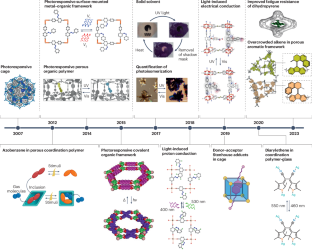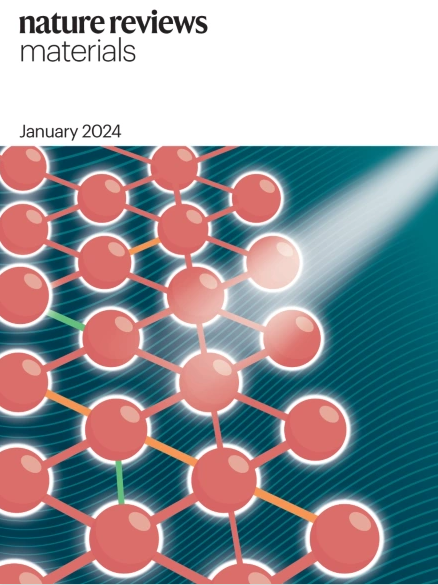利用多孔支架的有机固态光致变色
IF 86.2
1区 材料科学
Q1 MATERIALS SCIENCE, MULTIDISCIPLINARY
引用次数: 0
摘要
有机光致变色分子暴露在光线下时,其电子结构会发生快速、可逆的变化,从而导致颜色的改变。与溶液形式的光致变色剂相比,这些光致变色剂的固态复合材料更能抵御环境因素的影响,也更适用于商业环境。然而,固态基质往往会对这些化合物的光异构化造成几何限制,从而降低它们的光开关效率。这一基本限制极大地阻碍了有机光致变色剂在现实世界中的应用。在固态下保持有机光致变色剂的光开关行为的一种有前途的方法是将分子纳入具有精确设计孔隙的坚固多孔支架中,例如金属有机框架、共价有机框架、多孔有机聚合物或金属有机笼。这些支架的物理化学特性--如孔隙大小和结构、疏水性和电子特性--决定了集成光致变色剂的光开关效率,从而决定了材料的光致发光行为。然而,对于特定的有机光致色素,多孔基质的哪些特征会产生高效的固体光开关材料,目前还缺乏了解。在本综述中,我们探讨了限制基于有机光开关的固态光致变色材料的突出挑战。我们介绍了为高效光致变色材料确定最佳多孔支架的设计原则,最后展望了这些材料的未来机遇。本文章由计算机程序翻译,如有差异,请以英文原文为准。


Organic solid-state photochromism using porous scaffolds
When exposed to light, organic photochromic molecules undergo a fast and reversible change in their electronic structure, resulting in a shift in colour. Solid-state composites of these photochromes are more resistant to environmental factors and better suited for commercial settings than their solution forms. However, solid-state matrices frequently impose geometric limitations on the photoisomerization of these compounds, reducing their photoswitching efficiency. This fundamental constraint considerably impedes the use of organic photochromes in real-world applications. A promising approach to preserving the photoswitching behaviour of organic photochromes in the solid state is to incorporate the molecules within a robust porous scaffold featuring precisely designed pores, such as a metal–organic framework, covalent organic framework, porous organic polymer or metal–organic cage. The physicochemical properties of these scaffolds — such as pore size and structure, hydrophobicity and electronic character — determine the photoswitching efficiency of the integrated photochromes and, thus, the photoresponsive behaviour of the material. There is, however, a dearth of understanding about which features of a porous matrix yield efficient solid photoswitchable materials, given a particular organic photochrome. In this Review, we address the outstanding challenges limiting solid-state photochromic materials based on organic photoswitches. We present design principles for identifying the optimal porous scaffolds for high-efficiency photochromic materials and conclude with the future opportunities of these materials. A promising approach to preserving the photoswitching behaviour of organic photochromes in the solid state is to incorporate the molecules within a scaffold featuring precisely designed pores. This Review provides guidelines to identify porous scaffolds with the most promising performance in organic-based photochromic solids.
求助全文
通过发布文献求助,成功后即可免费获取论文全文。
去求助
来源期刊

Nature Reviews Materials
Materials Science-Biomaterials
CiteScore
119.40
自引率
0.40%
发文量
107
期刊介绍:
Nature Reviews Materials is an online-only journal that is published weekly. It covers a wide range of scientific disciplines within materials science. The journal includes Reviews, Perspectives, and Comments.
Nature Reviews Materials focuses on various aspects of materials science, including the making, measuring, modelling, and manufacturing of materials. It examines the entire process of materials science, from laboratory discovery to the development of functional devices.
 求助内容:
求助内容: 应助结果提醒方式:
应助结果提醒方式:


